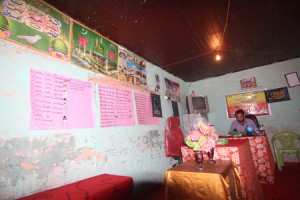Kashmir orphans are a dispossessed lot. Some of them are slowly falling prey to a stressful life spent behind the closed walls of ramshackled ‘homes’ that have mushroomed in Kashmir over the last two decades. SYED ASMA visits some of these orphanages and finds out how the dismal state of affairs and the lack of accountability affects the proper grooming of the destitute

It took almost half an hour in a long, dusty lane of Barbar Shah and a number of nagged pedestrians and neighbours who were left puzzled by our queries to locate a small address plaque written in vivid red, yellow and green. Beneath the board, a tiny wooden door opens into a small space spread over a few yards. The dilapidated building was once home to a Kashmir Pandit family who migrated to Jammu when violence erupted in Kashmir valley. Now, it is lying in shambles. And it is a temporary home to the orphans of Kashmir valley.
As we enter the door, the ugliness of a decrepit mud structure welcomes us. On its left side stands Senital Star School, a private school where some children of this orphanage study. A broken wooden staircase leads to the office of our destination; Alamdar Yateem Trust, a 20-year-old orphanage which has been operating in Kashmir after the insurgency against the Indian rule broke out in 1989. More than two decades of violence have left behind thousands of orphans who are being sent by the state administration as well as some NGOs operating in the valley for rehabilitation at different orphanages that have mushroomed in Kashmir, without any care for them.
“Actually, we have been changing our locations quite frequently. The people around this structure don’t know much about us,” explains Shaista Rafiq, the owner of Alamdar Yateem Trust. They have been operating from this structure for the last one year.
Shaista is the only permanent member of Alamdar Yateem Trust. She has been changing her staff. She claims that most of her old team members who left her orphanage have now come up with their own orphanages, “Opening up an orphanage in Kashmir seems to be an easy job these days,” she opines with a smile on her face.
Over the last two decades of turmoil in Kashmir, Shaista and his team have been renting buildings in different parts of the valley to take care of orphans. Shaista blames the limited revenue for not being able to build a single structure of her own. “The major portion of our funding comes from field collectors of whom we have 15. Independent donors too approach us but there are very few of them. We also own a couple of vans which visit various areas of Kashmir for fund raising. The owner of this building does not come often to Kashmir and does not ask us to pay rent either. He has been kind enough to us,” Shaista says.

The administration of Alamdar Yateem Trust claims that they take care of about 30 orphans; 15 in Barbar Shah and 15 in Dumail, Narbal, in Srinagar. But only a few of them are present on the campus. “The other children have been sent to their homes in Chadoora, Budgam. They had to appear in the examination. When we shifted from the previous place, we were not sure where we will land. To avoid difficulties in their studies, we shifted them back to their residences for the time being,” an administrator says.
But the people who visit the orphanage have also raised doubts about the administration, alleging that not many children were seen inside. “Every time I come to this place, only a few children are seen moving around,” says a local, who has offered donation to the orphanage in the past.
The office of Alamdar Yateem Trust is jam packed with people. Shaista introduces them as contributors and board members. All of them, except Shaista, have other jobs as well. Some of them are traders, some are contractors, and some are government employees.















